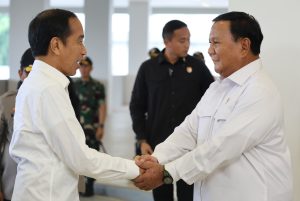The two losing Indonesian presidential candidates have called for a formal inquiry into the conduct of last week’s election, which was won in a resounding fashion by Defense Minister Prabowo Subianto.
This week, both Ganjar Pranowo and Anies Baswedan have expressed concerns that the February 14 election was marred by widespread irregularities, including vote-buying and intimidation.
While official results will not be announced until next month, unofficial counts show that Prabowo, a former New Order-era general, won the race in a single round of voting, with about 58 percent of the vote. Anies and Ganjar are projected to have secured 25 percent and 17 percent, respectively.
In the days since the election, the two campaigns have raised concerns about a range of shenanigans, including possible voter intimidation, manipulation of state institutions, and misuse of state resources, including welfare funds, during the campaign period.
On Monday, Ganjar, the former governor of Central Java who ran as the candidate for the ruling Indonesian Democratic Party of Struggle (PDI-P), urged parliament to commence an inquiry when it reconvenes on March 5. “Something like this must be investigated,” he said, according to Reuters. “At a minimum parliament should hold a hearing.”
Anies, a former governor of the capital Jakarta, yesterday lent his support to the probe. “We think it’s a good initiative by Mr. Ganjar to propose a parliamentary inquiry,” Anies told reporters, BenarNews reported. “We are confident that the Change coalition of Nasdem Party, PKB, and PKS will be ready to join,” he added, referring to the alliance of political parties that supported his candidacy.
According to BenarNews, Anies said his team had found evidence of widespread irregularities in the pre-election that influenced voters’ choices. “We have seen the practice of pressure and vote-buying before people went to the polls, which could potentially become a problem,” he said. “If such practices had not existed, the election would not have been decided in one round.”
Pre-election public opinion polls put Prabowo far head of his two rivals, but the Anies and Ganjar campaigns both banked on forcing him to a run-off in June that might have provided time for one of them to mount a credible challenge. However, critics of President Joko “Jokowi” Widodo alleged that he used the powers of his office to help Prabowo’s campaign win in a single round. He was also accused of manipulating his influence to engineer the selection of his son Gibran Rakabuming Raka as the ex-general’s vice-presidential running mate.
In order for an inquiry to proceed, Anies and Ganjar require the backing of more than half of the 580 lawmakers in the House of Representatives. This potentially seems within reach, given that the PDI-P and the three parties in Anies’ Change coalition hold a combined 295 seats. Whether it succeeds is another question entirely.
Many independent observers said that there were no signs of systematic fraud on election day, and in any event, one legal analyst told Reuters that such an inquiry would “not be able to annul election results.” Instead, it will serve the political function of applying pressure on the new administration in the months before it takes office.
Such challenges are not uncommon following Indonesian elections, perhaps due to the long gap between Indonesian elections and the inauguration of the president-elect. (Prabowo will not take the oath of office until October.) After losing to Jokowi in both 2014 and 2019, Prabowo contested the outcome in Indonesia’s Constitutional Court, citing widespread cheating. Both efforts failed.

































